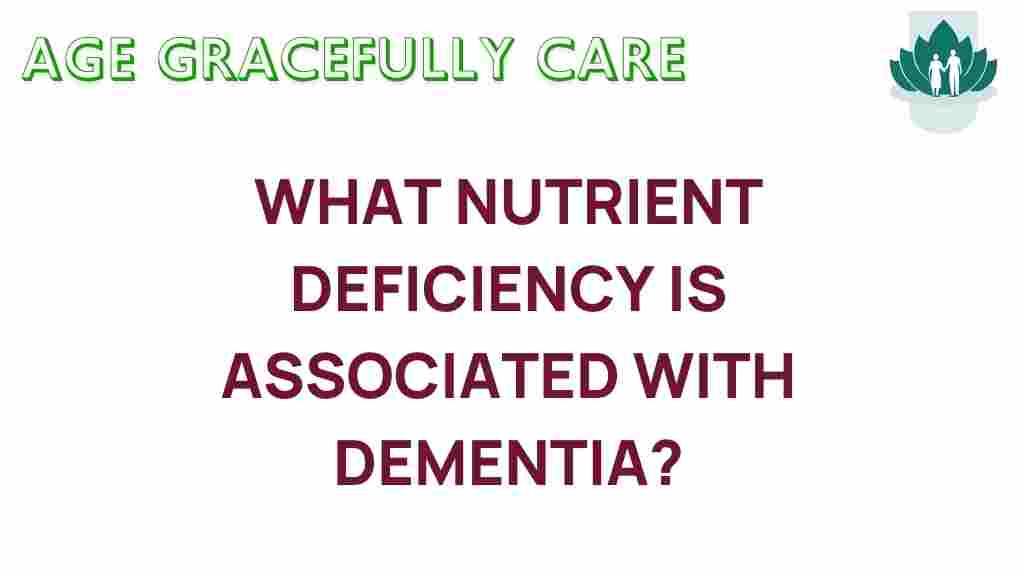Unveiling the Nutrient Deficiency Linked to Dementia Risk
Dementia is a growing concern worldwide, affecting millions of individuals and their families. As the population ages, understanding the factors contributing to cognitive decline becomes increasingly important. Recent research has highlighted the role of nutrient deficiency in increasing the risk of dementia. This article explores how specific dietary habits and the absence of crucial vitamins and minerals impact brain health and contribute to cognitive decline. We will delve into the essential nutrients that play a significant role in maintaining mental wellness and the steps you can take to enhance your nutrition for better cognitive health.
The Link Between Nutrition and Dementia
Nutrition is a vital aspect of overall wellness, and its impact on brain health cannot be overlooked. Several studies have shown that a balanced diet rich in essential nutrients can help reduce the risk of dementia and cognitive decline. The brain requires a variety of nutrients to function optimally, making it imperative to understand which vitamins and minerals are essential for cognitive health.
Key Nutrients for Brain Health
- Omega-3 Fatty Acids: Found in fish, flaxseeds, and walnuts, these essential fats have anti-inflammatory properties that support brain function.
- Vitamin D: Often called the “sunshine vitamin,” vitamin D plays a crucial role in brain health. Low levels are associated with an increased risk of cognitive decline.
- B Vitamins: B6, B12, and folate are essential for brain function and energy metabolism. A deficiency in these vitamins can lead to cognitive impairments.
- Antioxidants: Vitamins C and E, found in fruits and vegetables, help protect brain cells from oxidative stress.
- Minerals: Zinc and magnesium are critical for maintaining cognitive function and overall brain health.
Understanding the Risks of Nutrient Deficiency
Deficiencies in essential nutrients can lead to significant health issues, including increased risk for dementia. Understanding how these deficiencies affect brain health is crucial.
How Nutrient Deficiencies Contribute to Cognitive Decline
When the brain does not receive the necessary nutrients, it can lead to a decline in cognitive functions. Here are some ways nutrient deficiencies contribute to dementia:
- Impaired Neurotransmitter Function: Nutrient deficiencies can affect the production of neurotransmitters, which are critical for communication between brain cells.
- Increased Inflammation: A lack of omega-3 fatty acids can lead to increased inflammation in the brain, which is linked to dementia.
- Oxidative Stress: Antioxidant deficiencies can result in oxidative damage to brain cells, accelerating cognitive decline.
- Reduced Blood Flow: Nutritional deficiencies can impact cardiovascular health, reducing blood flow to the brain and impairing cognitive function.
Step-by-Step Process to Improve Nutritional Habits for Brain Health
Improving your dietary habits can significantly impact your brain health and reduce the risk of dementia. Here’s a step-by-step guide to enhance your nutrition:
Step 1: Analyze Your Current Diet
Begin by keeping a food diary for a week. Track what you eat and drink, noting portion sizes and meal times. This analysis will help you identify areas where you may be lacking in essential nutrients.
Step 2: Incorporate Brain-Boosting Foods
Focus on adding foods rich in the nutrients mentioned earlier. Here are some suggestions:
- Fatty Fish: Salmon, mackerel, and sardines are excellent sources of omega-3 fatty acids.
- Leafy Greens: Spinach, kale, and broccoli are packed with antioxidants and vitamins.
- Nuts and Seeds: Almonds, walnuts, and chia seeds provide healthy fats and minerals.
- Berries: Blueberries and strawberries are rich in antioxidants that protect brain health.
Step 3: Consider Supplements
If you find it challenging to meet your nutrient requirements through diet alone, consider supplements. Consult with a healthcare professional to determine which supplements may be beneficial for you, particularly for:
- Vitamin D
- B Vitamins
- Omega-3 Fatty Acids
Step 4: Maintain Hydration
Staying hydrated is essential for maintaining cognitive function. Aim to drink at least 8 glasses of water a day. Remember, dehydration can lead to confusion and cognitive decline.
Step 5: Monitor Your Progress
Keep track of how changes in your diet affect your overall wellness and cognitive health. Consider regular check-ups with your healthcare provider to monitor nutrient levels and cognitive function.
Troubleshooting Common Nutritional Challenges
Implementing new dietary habits can be challenging. Here are some common issues and how to address them:
Issue 1: Lack of Time for Meal Prep
Solution: Prepare meals in batches. Cook large portions and store them in the refrigerator or freezer for quick access during busy days.
Issue 2: Limited Access to Fresh Produce
Solution: Consider frozen fruits and vegetables, which are often just as nutritious as fresh options and can be stored for longer periods.
Issue 3: Unfamiliarity with Healthy Recipes
Solution: Explore online resources or cookbooks focusing on healthy eating. There are many simple recipes available that prioritize brain health.
Conclusion: The Importance of Nutrition in Dementia Prevention
In conclusion, the connection between dementia and nutrient deficiency is significant. By prioritizing nutrition and incorporating essential vitamins and minerals into your diet, you can improve your brain health and potentially reduce the risk of cognitive decline. Paying attention to your dietary habits and making informed choices about what you eat is crucial for long-term wellness.
For more information on how to maintain a healthy diet for brain health, visit this resource. Remember, it is never too late to start making healthier choices for your brain!
Taking proactive steps today can lead to a healthier tomorrow. Prioritize your wellness and embrace the power of nutrition in your daily life.
This article is in the category Health and created by AgeGracefullyCare Team
